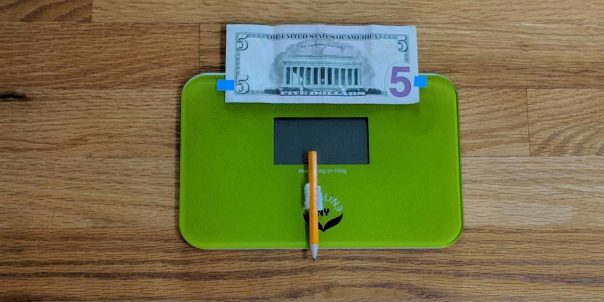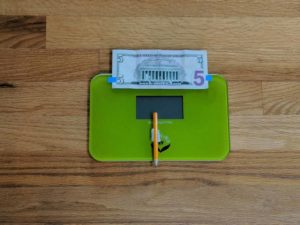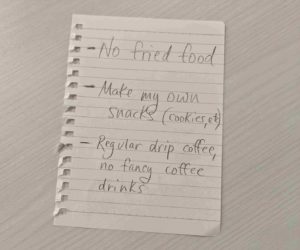There are times where it’s inconvenient to weigh yourself daily. Anytime that you’re out of your normal daily routine can be hard—for instance, vacations, and visiting friends and family. Even people that have lost a lot of weight, reached their goal weight, and have kept it up for years have difficulty when they’re not able to weigh themselves daily.
During the honeymoon, and later while staying with his wife’s family, Chris didn’t have access to a scale. This proved disastrous. He knew he was gaining weight—he could feel it—but without the scale, it was impossible to gauge exactly how much he was gaining. Without the daily reminder that he was overeating, it was impossible for him to refuse temptation.
—The Economist’s Diet
Chris Payne, one of the co-authors of The Economist’s Diet, stepped on the scale after his honeymoon and realized that he had gained 10 pounds. And this was after he had lost a large chunk of weight, and kept off that weight for 18 months. It was frustrating, but he started stepping on the scale every day again, got back on track, and lost those 10 pounds within 2 months.
This story illustrates a few points:
- Maintaining your weight during travel can be really difficult
- Stepping on the scale daily is very important. Even if you know you’re gaining weight, it’s easier to ignore if you don’t know the number.
- This applies to everyone, even to people who have successfully kept their weight off for a long time. Knowing your weight—the actual number—can give you a reason to say “no” to temptation.
- During travel, you’re even more vulnerable to weight gain. Not only because you’re away from your scale but because your routine is out of whack, and you’re probably eating much more restaurant food. If you’re on a cruise, or an all-inclusive resort, you may be constantly tempted with all-you-can-eat buffets of the most appetizing foods that exist.
Here’s the good news. There are inexpensive, travel-sized bathroom scales that are just as accurate as regular-sized scales. I own a travel scale (shown in the picture above), and often take it on trips. It’s tiny and lightweight, about the dimensions of a sheet of paper folded in half, but thicker. I taped a 5 dollar bill to it so you can get an idea of the size.
Bringing a travel scale on trips may seem like overkill. I would have called it extreme myself, a few years ago. But that was before I realized how out of whack our food environment is, and how easy it is to gain weight when you’re not weighing yourself daily.
Ten or twenty years ago, the weight I gained during travel or visits to family came off again without much effort. I regularly gained a few pounds during trips. That extra weight would disappear in a few weeks, almost without effort.
But as the decades pile on, as you exit your 20’s and get into your 30’s, 40’s and beyond—things change. Your body changes. The small weight gains, the ones that easily vanished a decade ago—they stay with you. Most people aren’t paying attention, and end up gradually gaining weight over the years. And currently, more and more people are entering their 20’s overweight, and at a very high risk of becoming obese.
To avoid this, the first thing to do is to know your weight. Track your weight. I recommend bringing a travel-sized digital bathroom scale on trips. The picture above shows my travel scale, with a small pencil attached with velcro. I usually tape a small sheet of paper to it, to log my weight.
It depends on the type of trip, of course. I sometimes go on backpacking trips, where a light pack is important, so it of course I skip the scale.
Your weight will probably fluctuate more than normal when traveling. That’s because we eat differently when we travel—we eat out more, we eat fewer fruits and vegetables. So, expect more ups and downs. But you don’t need to stop your habit of weighing yourself.






